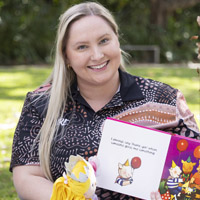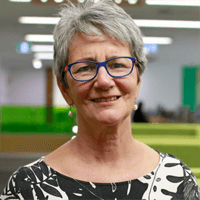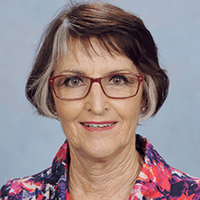Fast Facts
Location
Commencing
- Online: January, March, July, September, November
Fees
$4,124.00+
+estimated annual Commonwealth Supported Fee for a full-time study load
Plus Student Services and Amenities fee
Fee deferral and scholarships available if eligible
Duration
5 years and 4 months part-time
Entry Requirements
ATAR 65
English, General Maths or Mathematical Methods or Specialist Maths, General Science subject (Units 3/4,C)
QTAC Codes
- 313319
Course detail
Make a difference in the lives of young children and begin your career in early childhood education at JCU. Gain professional experience in your first year and complete a total of 120 days of workplace learning over the course of your degree.
Take advantage of JCU’s strong partnerships with childcare centres, kindergartens, preschools, and primary schools to develop your network and build practical job skills.
Develop specialist skills needed for teaching in rural and remote areas and work to improve Indigenous education outcomes. Study online (external) or on-campus and cover essential areas of child development, learning, behaviour, wellbeing, curriculum and education for the diverse learning needs of the early years.
Additional information
About JCU's Bachelor of Early Childhood Education
Are you ready to make a difference in the life of a child? Do you have what it takes to not just pass on information, but offer comprehensive support to a young person in all aspects of life? Your rewarding career in teaching begins with a Bachelor of Education (Early Childhood Education) from JCU. Through the early childhood education courses you take at JCU, you will leverage a world-class education into a career that will change lives, including your own.
An Early Childhood Degree Focused on You
You care about children, and you know that the youngest of us are the most vulnerable. You have a passion to prepare for a career guiding young children safely into the next stage of education and development. With your early childhood education degree, you will be positioned to work in schools, preschools, kindergartens childcare centre and anywhere in Australia.
As you earn your bachelor of early childhood education, you will be gaining real-world workplace experience from the very first year. You will be able to make the most of JCU’s connections with some of the best primary schools, preschools and childcare centres in the country. With these connections, you will quickly develop your skills while building a professional network for life.
You want to do more than just pass on facts and information to your future students, and in your own studies you expect more than just theory. Your early childhood degree will equip you with strong practical skills to reach those in rural and Indigenous communities. You will be ready to develop curriculum, build learning strategies and help your students with all aspects of child development.
Early Childhood Education Courses That Lead to Fantastic Careers
This bachelor of early childhood education, Queensland is fully accredited through the Australian Children’s Education & Care Quality Authority. The program is also overseen by the Queensland Office for Early Childhood Education and Care and the Department of Education, Training and Development and is accredited by the Queensland College of Teachers.
With this kind of expertise behind your studies, you will be poised to register and work with children anywhere in Australia. Wherever you want to go, and whatever level of teaching you want to do, your path is completely open. Your early childhood education course will prepare you for anything.
Not only will you be ready to work directly as a teacher, but you will also be grounded in modern social and environmental sustainability goals. You will be equally at home working in capital cities or in rural and Indigenous communities. Your world class education begins here, and you can even take your training and skills overseas.
An Early Childhood Degree with Great Learning Resources
You will be well supported as you pursue your early childhood teacher course. JCU is committed to student success with small class sizes and lecturers who want to see you finish well.
You will have access to our popular Peer Assisted Study Sessions (PASS), where you can work with students from the same course to revise difficult material, consider different perspectives and discuss ideas together to gain a deeper understanding. You can also sign up for self-study workshops focusing on effective note taking, studying for exams and writing assignments.
Not only will you study early childhood education, you will also gain a strong foundation in everything an educator needs to know to help young children. When you graduate with your Bachelor of Education Early Childhood Education, you will have a comprehensive grasp of maths, statistics and academic reading and writing in addition to your core focus of education.
You will also understand the health and physical education needs of children, how to use technologies in your curriculum and know how to educate effectively in a culturally diverse context.
As you progress, you will stay in regular contact with a skilled learning advisor who will help you develop your learning strategies and professional written communication skills. When you graduate, you will have the confidence and skills to start your career anywhere.
Your Future Starts Here
When you finish your early childhood teacher course, you will begin more than just a career. You will be pursuing a true calling and will reap lifelong benefits. Start your early childhood education degree at JCU and get ready to make all the difference in the lives of Australian children.
Study online
The Bachelor of Education (Early Childhood) external (online) course is built for students with busy lives. You will study one subject at a time, up to six times a year. Each subject goes for seven weeks, allowing you to focus on a single area of study each time. It also spreads your study load across the year, and you still get 10 weeks of breaks. By completing six subjects per year, you can complete a Bachelor of Education (Early Childhood) in 5.5 years.
Consult the handbook for a detailed overview of available subjects.
Inherent requirements
Inherent requirements are the identified abilities, attributes, skills, and behaviours that must be demonstrated, during the learning experience, to successfully complete a course. These abilities, attributes, skills, and behaviours preserve the academic integrity of the University’s learning, assessment,and accreditation processes, and where applicable, meet the standards of a profession.
JCU Education (Early Childhood Education) graduates have a nationally accredited degree that enables them to be employed across Australia.
Graduates can pursue careers in education in schools, preschools, kindergartens, and childcare centres.
This course is nationally accredited through the Australian Institute for Teaching and School Leadership (AITSL) in association with the Queensland College of Teachers (QCT). Graduates are eligible for teacher registration in Australia.
The Bachelor of Education (Early Childhood Education) is fully accredited with ACECQA, which is the Australian Children's Education and Care Quality Authority.
Entry score threshold
These are the lowest adjusted scores we made an offer to in Semester 1, 2023. Entry scores are based on the most recent Semester 1 intake and are updated in June each year. Meeting the threshold doesn't guarantee admission.
ATAR/Selection Rank: 70.00
Entry score range
This table shows the range of entry scores for recent secondary students offered a place in the Bachelor of Education (Early Childhood Education) for Semester 1, 2023. The table includes offers deferred to Semester 1, 2023 which may have been assessed using the entry score threshold of an earlier year.
JCU Townsville
| Without adjustments | With adjustments* | |
|---|---|---|
Highest | <5 | <5 |
Median | <5 | <5 |
Lowest | <5 | <5 |
JCU Cairns
| Without adjustments | With adjustments* | |
|---|---|---|
Highest | <5 | <5 |
Median | <5 | <5 |
Lowest | <5 | <5 |
External
| Without adjustments | With adjustments* | |
|---|---|---|
Highest | <5 | <5 |
Median | <5 | <5 |
Lowest | <5 | <5 |
Notes:
<5 – indicates less than 5 OP/ATAR-based offers made.
* Refer to Adjustment Factors
Find out more about who you might study with by viewing this course’s student profile.
Adjustment factors
James Cook University applies bonus ranks under the Regional Preference Scheme and QTAC’s Educational Access Scheme (EAS). Learn more about JCU’s adjustment factors.
Handbook year | Information valid for students commencing in 2024 |
Course code | 109210 |
Course type | Bachelor Degree (AQF Level 7) |
Professional accreditation status | This course is nationally accredited through the Australian Institute for Teaching and School Leadership (AITSL) in association with the Queensland College of Teachers (QCT). Graduates of this course are eligible for Teacher registration in Australia. This course is also nationally accredited through the Australian Children’s Education & Care Quality Authority (ACECQA). Graduates are eligible for employment in the early childhood area (0-8 years) as an educator or service provider. In Queensland the Regulatory Authority is the Office for Early Childhood Education and Care, Department of Education, Training and Employment. |
Owner | Academy |
| College | Arts, Society and Education |
Award Requirements
Admission Requirements
Course pre-requisites | English (Units 3/4,C), General Mathematics or Mathematical Methods or Specialist Mathematics (Units 3/4,C), and a General Science subject (Units 3/4,C); or equivalent. |
Minimum English language proficiency requirements | Applicants of non-English speaking backgrounds must meet the English language proficiency requirements of an overall score of 6.5 in Academic IELTS (or equivalent) with sub-scores no less than 7.0 in Speaking and Listening and no less than 6.0 in Reading and Writing. The cost of the testing will be met by the applicant. English test results must be no more than two years old at the commencement of the course. |
| Additional selection requirements | All applicants for initial teacher education courses must satisfy both academic and non-academic entry criteria. Applicants’ non-academic capabilities will be assessed by way of an instrument applied by QTAC and developed in consultation with the Australian Council of Deans of Education. |
Post admission requirements | Professional practice: This course includes prescribed professional placements. Students may be required to undertake such placements away from the campus at which they are enrolled, at their own expense. Further information about placements can be found at Coursework Enrolment Procedure Suitability to Work with Children Card (blue card): This course includes prescribed professional placements that may involve contact with children under 18 years of age. Students are required to obtain a Suitability to Work with Children Card (which involves a criminal history check undertaken by the Queensland Police) before the start of the first placement in an Australian school setting. Students undertaking professional placements in Australian school settings must retain a current Suitability to Work with Children Card for the duration of their course, as failure to do so will result in the termination of their admission to the course. For more information, refer to: Blue Card Services |
Academic Requirements for Course Completion
Credit points | 96 credit points as per course structure |
Additional completion requirements | Successful completion of Literacy and Numeracy Test for Initial Teacher Education (LANTITE) is an expected requirement of the Australian Ministers for Education for all graduates. Therefore all students enrolled in an initial teacher education course (either undergraduate or postgraduate) will be expected to sit and meet the test standard prior to graduation. All students must sit and meet the standard of the Literacy and Numeracy Test for Initial Teacher Education Students (LANTITE) prior to their final placement and GTPA.The cost of the testing will be met by the applicant. Refer to https://teacheredtest.acer.edu.au/ All students must successfully complete a final-year teaching performance assessment (Graduate Teacher Performance Assessment [GTPA]) embedded in a subject and a professional placement of no less than four weeks in the final year of the degree, prior to graduation that is shown to: a) be a reflection of classroom teaching practice including the elements of planning, teaching, assessing and reflecting; b) clearly assess the content of the Graduate Teacher Standards; and c) demonstrate an understanding of moderation processes that support consistent decision-making against achievement criteria. The GTPA is built into course requirements and assessments. All students must possess dispositional attributes deemed suitable for the profession of teaching. Students must participate in a 3-day intensive Professional Orientation Program in the final year of the course. Students must complete a minimum of 41 days of professional experience the third and fourth year of the program in recognised school settings in Australia. All professional experience placements with children aged 3-8 years must be completed in sites that deliver an approved curriculum (i.e., the Queensland Kindergarten Learning Guideline, the Early Years Learning Framework, or the Australian Curriculum); be supervised by teachers currently registered in Australia; and meet the academic requirements prescribed in the relevant Professional Experience Handbooks. |
Course learning outcomes | In the context of a JCU graduate, on successful completion of the Bachelor of Education (Early Childhood Education), graduates will be able to:
|
Inherent Requirements
Inherent Requirements | Inherent requirements are the identified abilities, attributes, skills, and behaviours that must be demonstrated, during the learning experience, to successfully complete a course. These abilities, attributes, skills, and behaviours preserve the academic integrity of the University's learning, assessment, and accreditation processes, and where applicable, meet the standards of a profession. For more information please visit: Early Childhood Education. |
Reasonable adjustments | All JCU students have the opportunity to demonstrate, with reasonable adjustments where applicable, the inherent requirements for their course. For more information please visit: Student Disability Policy and Procedure. |
Course Structure
CORE SUBJECTS
Level 1
ED1401:03 Education Perspectives and Practice
ED1411:03 Science and Sustainability in Education
ED1421:03 Foundations of Language and Literacy in Education
ED1439:03 Early Childhood Education and Care 1
ED1440:03 Technologies for Early Childhood Education
ED1443:03 Arts Education for Early Childhood
ED1481:03 Educational Psychology: Learners and Learning
ED1492:03 Teaching Mathematics and Numeracy in Primary and Early Childhood Settings
Level 2
ED2090:03 Health and Physical Education for Early Childhood
ED2093:03 Early Childhood Mathematics and Numeracy 1
ED2094:03 Approaches to Oral Language and Reading Development in the Early Years
ED2491:03 Planning for Engaging Learning
ED2991:03 Aboriginal and Torres Strait Islander Education
ED2096:03 Humanities and Social Sciences for Early Childhood Education
ED2095:03 Science Education for Early Childhood
ED2097:03 Play Pedagogies for Early Learners
Level 3
ED3442:03 Inclusive Education: Differentiated Learning for Students with Special Needs and Abilities
ED3443:03 English as an Additional Language/Dialect for Indigenous Learners
ED3441:03 Technologies Across the Curriculum
ED3223:03 Communicating and Producing Texts in Early Childhood Contexts
ED3096:03 Early Childhood Mathematics and Numeracy 2
ED3097:06 Reflective Teaching Cycles and Positive Learning Environments (ECE)
ED3590:03 Early Childhood Education and Care 2
Level 4
ED4460:03 Service Learning for Sustainable Futures
ED4622:03 Learning and Teaching in Rural and Remote Contexts
ED4486:03 Fourth Year Professional Experience A
ED4490:06 Fourth Year Professional Experience B
ED4621:03 Leading Wellbeing and Sustainability in Learning Communities
ED4623:03 Teachers as Ethical and Collaborative Change Agents
ED4995:03 Education across Culturally Diverse Contexts
Location
COURSE AVAILABLE AT | NOTES |
JCU Online | This course is delivered online with the exception of professional experience placement in Australian schools or early learning centres, as required for professional accreditation. |
Candidature
Expected time to complete | 5.3 years part-time |
Maximum time to complete | 11 years |
Maximum leave of absence | 3 years |
Progression
Course progression requisites | To ensure satisfactory progression, a minimum of three subjects must be taken in any 12-month period. Students must successfully complete LANTITE prior to their placement and GTPA assessment in their final year of study. |
Course includes mandatory professional placement(s) | This course includes prescribed professional placements. Students may be required to undertake such placements away from the campus at which they are enrolled, at their own expense. Only those students who complete the majority (12 credit points or more) of prescribed education placements in schools in Australia will be automatically verified for teacher registration in Queensland. Further information about placements can be found at Coursework Enrolment Procedure. Students who do not complete 41 days or more of prescribed education placements in schools in Australia will be automatically transferred to the non-accredited Bachelor of Early Childhood Education and will not be immediately eligible for teacher registration in Queensland. |
Special assessment requirements | Suitability to Work with Children Care (blue card) This course includes prescribed professional or clinical placements that may involve contact with children under 18 years of age. Students undertaking professional placements in Australian school settings are required to obtain a Suitability to work with Children Card (which involves a criminal history check undertaken by the Queensland police) before the start of the first placement. Students must retain a current Suitability to Work with Children Card for the duration of their course, as failure to do so will result in the termination of their admission to the course. For more information, refer to: Education Blue Card Students who do not complete the required number of days of a professional experience subject or a professional component of a subject, without the approval of the Director of Professional Experience, will be determined to have failed the subject. Refer to Review of a Student’s Suitability to Continue a Course Involving Placement policy. |
Professional accreditation requirements | Successful completion of all subjects contributes to the requirements for the Queensland College of Teachers Graduate level of the Australian Professional Standards (APST). Please also see `Additional Completion requirements’ in reference to the GTPA. Graduates are eligible for employment in the early childhood area (0-8 years) as an educator or service provider. In Queensland the Regulatory Authority is the Office for Early Childhood Education and Care, Department of Education, training and Employment and at the National level it is the Australian Children’s Education & Care Quality Authority (ACECQA). The Bachelor of Education (Early Childhood Education) includes a specialisation in English/Literacy, providing graduates with knowledge and skills in this specialisation area. The subjects comprising this specialisation are:
|
Supplementary exam for final subject | Not applicable |
Credit
Eligibility | Students may apply for a credit transfer for previous tertiary study or informal and non-formal learning in accordance with the Credit Transfer Procedure. |
Maximum allowed | 63 credit points |
Currency | Credit will be granted only for studies completed in the 10 years prior to the commencement of this course. |
Expiry | Credit gained for any subject shall be cancelled 21 years after the date of the examination upon which the credit is based if, by then, the student has not completed this course. |
Other restrictions | Not applicable |
Award Details
Award title | BACHELOR OF EDUCATION (EARLY CHILDHOOD EDUCATION) |
Approved abbreviation | BEd(ECE) |
Inclusion of majors on testamur | Not applicable – this course does not have majors |
Exit with lesser award | Students who have completed 24 credit points of their course award requirements, and withdraw from or fail to meet the requirements for progression in the later years, may be eligible for the award of Diploma of Tertiary Studies. Students who exit the course prior to completion, and have completed 72 credit points of study and appropriate subjects, may be eligible to receive the award of Bachelor of Educational Services. |
Course articulation | Not applicable |
Special awards | Students may receive an Award of Recognition in accordance with the Recognition of Academic Excellence Procedure |
Estimated annual Commonwealth Supported fee: $AUD4,124.00
A Student Services and Amenities fee is payable per subject up to a maximum amount per year.
A variety of Scholarships are available to suit different student types.
JCU Prep provides a pathway into this course. Enrolling in this flexible program will enable you to meet entry requirements including subject pre-requisites and ATARs. Introductory academic subjects are also available to prepare you for tertiary study.
*Excludes entry into the Bachelor of Advanced Science, Bachelor of Dental Surgery, Bachelor of Laws, Bachelor of Marine Science, Bachelor of Medicine, Bachelor of Surgery, Bachelor of Nursing Science – Bachelor of Midwifery, Bachelor of Pharmacy (Honours), Bachelor of Physiotherapy, and Bachelor of Veterinary Science (Honours).
Note the course QTAC code for the location you've chosen. You'll need to enter it as part of your QTAC application.
Application dates vary between courses, whether they're delivered in semester, trimester or carousel study modes. View our Application due dates page for more information.
All applicants for initial teacher education courses (pre-service teachers) must satisfy both academic and non-academic entry criteria.
English language requirements
Applicants of non-English speaking backgrounds must meet the following English language proficiency requirements:
- An overall score of 6.5 in Academic IELTS (or equivalent) with no sub-score less than 7.0 for Speaking and Listening and no sub-score less than 6.0 for Reading and Writing.
If you do not meet the English language requirements you can apply to study a University-approved English language program.
ATAR score is indicative only. Entry scores will be finalised in the major offer round.
Real stories
-

Student
Tabitha McCann
Bachelor of Education (Early Childhood Education)
I like the flexibility of JCU's external study options as I work full time. The course offers placements in early childhood education and schools, providing experience with different communities and age groups. The hands-on experience is more than any other university I've studied at.
-

International Student
Kathri Thanthri Hewage Nipuni
Bachelor of Education (Early Childhood Education)
If you're passionate about working with children JCU is the place to do it, because the support that you can gain from the university is just beyond words. I transferred from JCU Singapore to Townsville and the children in Far North Queensland are friendly and the lecturers helpful and supportive.
-

Alumni
Bianca Rogers
Bachelor of Education (Early Childhood Education)
I felt the help was there if it was needed and that’s what I loved about my course and about JCU. Even when studying the course online, you will be supported. Making sure students have that level of comfort is a strength for JCU.
-

Lecturer
Dr Marcia Thorne
Education
Learning online about early childhood education is stimulating and rewarding. Subjects are full of interactive components and hands-on activities. Our students learn science experiments that are colourful and fun. Art and dance bring out your creativity. With intentional teaching we put play into learning.
-

Employer
Jan Cooper
Principal, Annandale State School, Townsville QASSP President
Principals greatly value the close liaison between JCU Education and schools. This liaison ensures that pre-service teachers receive authentic and effective professional experience placements in schools. JCU Education graduates are well-prepared academically and practically for their demanding careers as educators.